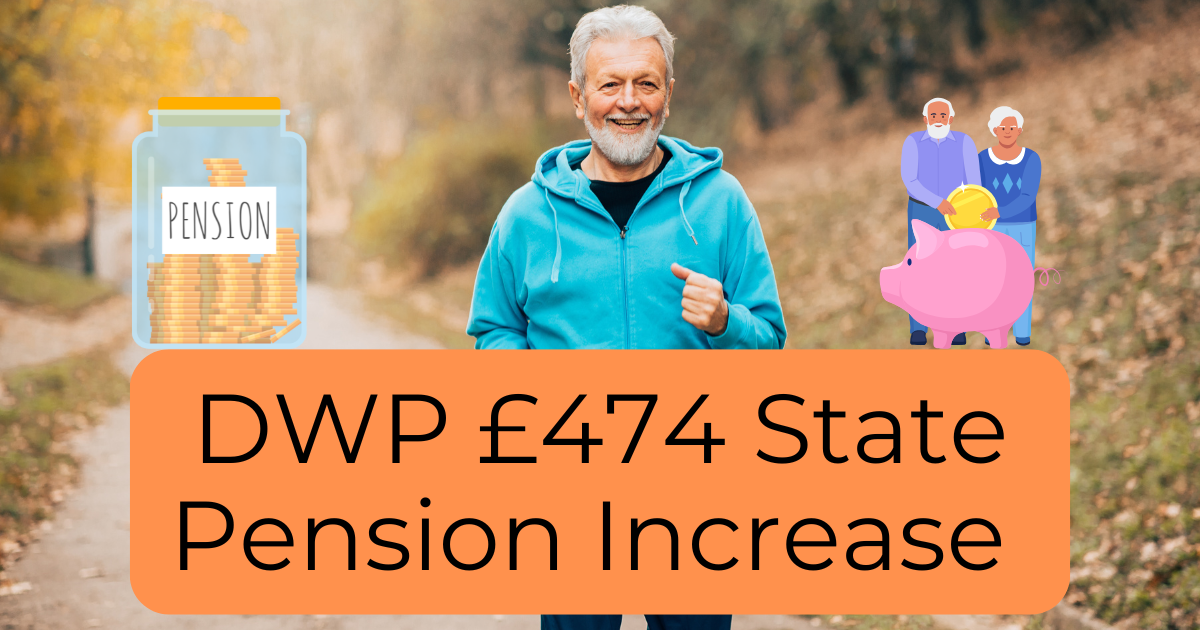DWP £474 State Pension Increase 2025: How Much More Pensioners Will Get. There will be a significant change in the state pension payments of the UK. The government has announced this increase to help people keep pace with inflation and the rise in the cost of living. The state pension is to rise in the 2025/2026 financial year, with the uplift starting in April. If you’d like to know more about the topic DWP £474 State Pension Increase 2025: How Much More Pensioners Will Get, please keep reading the article.
DWP £474 State Pension Increase 2025
The State Pension is the monthly retirement payment provided to the citizens when they meet the retirement age, which is at present set at 66 for both male and female. This source of income comes from a large fund that taxpayers contributed to the national insurance. It is later utilized to disburse State Pensions, Jobseeker’s Allowance, Maternity pay, Employment and Support Allowance, and Bereavement Support payments.

Starting on April 7, 2025, an increase in state pension payments can be seen in the accounts of millions of pensioners. According to current data, the number of people claiming the state pension was 13 million by August 2024, reflecting an annual rise of 203,000. This growing number highlights the importance of pension adjustments for retirees who depend on these payments.
Payment Amount
Every year in April, the government makes changes in the state pension and other allowances to fulfill the requirements of applicants and offer them monetary aid. As of 2025, an increase of 8.5% will be seen in the pension system. Last year, the pension rate was 6.7%, which hiked to 8.5% in 2025. The Triple Lock in UK State Pension guarantees that the pension will hike yearly by the highest of three measures: average income growth, inflation, or a minimum of 2.5 percent.
| Type of Pension | Current Weekly Rate | New Weekly Rate | Annual Increase |
| New State Pension | £221.20 | £230.25 | £470.60 |
| Basic State Pension | £169.48 | £176.45 | £362.65 |
Eligibility for the Full Pension
The payment amount of an individual depends on their National Insurance (NI) contributions. The eligibility criteria are as follows:
| Type of Pension | Minimum NI Years | Full Pension NI Requirement |
| New State Pension | 10 years | 35 years |
| Basic State Pension (Men born 1945-1951) | 1 year | 30 years |
| Basic State Pension (Men born 1945) | 1 year | 44 years |
| Basic State Pension (Women born 1950-1953) | 1 year | 30 years |
| Basic State Pension (Women born before 1950) | 1 year | 39 years |
Payment Dates
The government of the UK will begin distributing the payment immediately after accepting your application. In the upcoming month, the State pension will be refunded on 30 May 2025. Meanwhile, the ongoing month will be paid for on 31 July, which falls on Friday.
The amount of pension you can get in the forthcoming month will depend on your partial or full state pension. Those who obtain partial pension will be funded with £169.50 weekly, whereas those on full pension are entitled to a higher payment of £221.20 weekly.
Statements by Sir Stephen Timms MP
On 5th February, the minister for Social Security and Disability, Sie Stephen Timms MP (Lab, East Ham), gave a statement on the draft Social Security Benefits Up-rating Order 2025, which was approved.
- The draft Social Security Benefits Up-rating Order 2025 will increase relevant state pension rates by 4.1%, in line with the growth in average earnings in the year to May to July 2024.
- It will increase most other benefit rates by 1.7, in line with the rise in the consumer price index in the year to September 2024.
- The government’s commitment to the triple lock means that the basic and full rate of the new state pension will be uprated by whichever is highest out of the growth in earnings, the growth in prices, or 2.5%.
- This will rise to 4.1% for 2025–26.
- 169£ From April this year, the basic state pension will increase from £169.50 per week to £176.45, and the full rate of the new state pension will increase from £221.20 to £230.25.
- The government is fully committed to maintaining the pension triple lock.
However, there is increasing query about the triple lock’s sustainability, growing concerns about whether it will remain intact in the future. While Labour has confirmed no plans to quit the scheme, conservative leader Kemi Badenoch has hinted at potential changes if she is elected.
Specialists at Spencer Churchill Claims Advice have warned: “The triple lock has been a lifeline for pensioners, making sure their income keeps up with the cost of living. But with the growing pressure on public finances and the aging population, its future is uncertain.” They caution: “If the triple lock is reduced or scrapped, people will have to take even more responsibility for funding their own retirement.”

